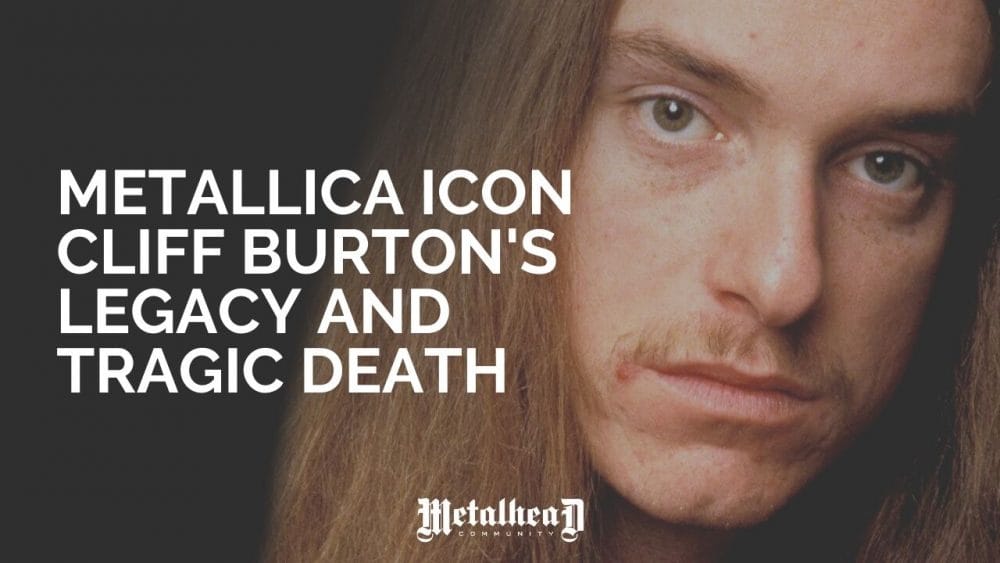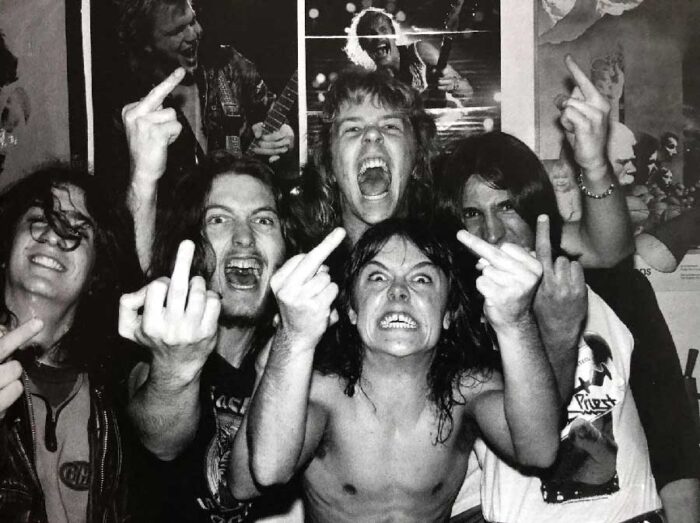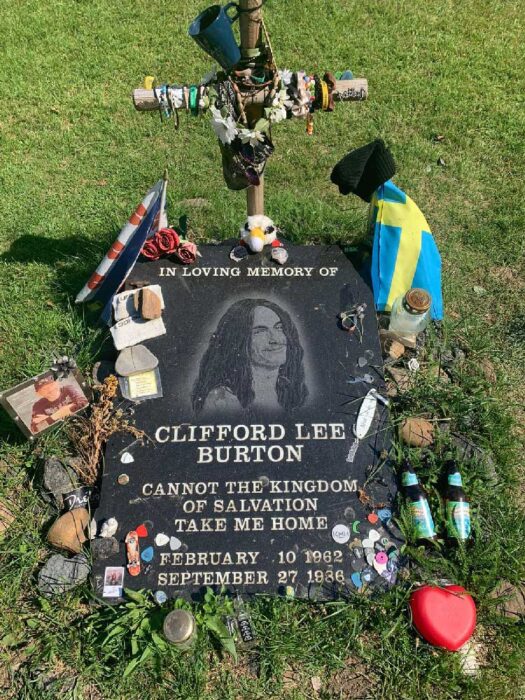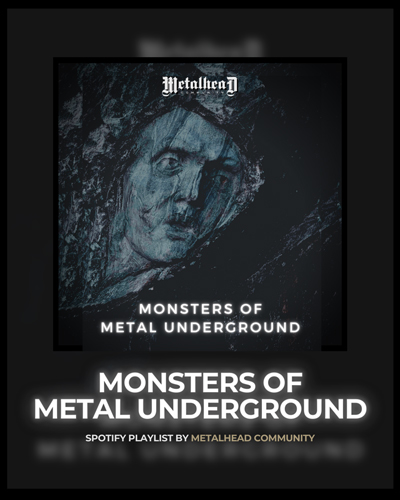Metallica Icon Cliff Burton, His Legacy and Tragic Death

Cliff Burton was born in San Francisco, California, in 1962, in the midst of the Hippie movement. His parents were part of that commune, and both he and his two elder siblings grew up in a country that saw on television how Uncle Sam lost the first war in its history—I speak of Vietnam.

From a young age, music began to attract his attention. At the age of six, he attended piano lessons. At 13, Cliff suffered the first setback of his life: his older brother David Scott Burton died of a brain aneurysm. A fact that marked him greatly, he always said that he wanted to be the best at what he did and dedicate it to his brother.
He left the piano and began to play bass. At first, he was not good at it. During this period, he started playing with bands like AD 2 Million, Agents of Misfortune, along with Jim Martin, who later became a member of Faith No More—the turns that life gives.
After a year of taking classes, his teacher told him that he was much better than him and that he had nothing more to teach him. But he believed that he still had more to learn, so he went to Steve Doherty, a jazz bassist who was very important in his life and who helped him define his playing style definitively. Doherty taught him to play other styles, like jazz, among many others. He did not neglect his studies and graduated in 1980 from Castro Valley High School.
A Rising Star in Metal's History and His Impact on Metallica
The American bassist Cliff Lee Burton, in 1982, was part of the unknown metal group Trauma. Although he was destined to leave his mark in the golden annals of rock history, at just 20 years old, he had earned a deserved reputation as one of the best musicians on the California metal scene. So it was only a matter of time before he was recruited by a band that was more in line with his budding talent as an instrumentalist and songwriter.
In 1982, during a performance that Trauma offered at the famous Los Angeles venue "Whiskey a Go-Go," guitarist and singer James Hetfield and drummer Lars Ulrich, the two young founders of a promising thrash metal band Metallica, were also present. They were shocked to see Cliff Burton playing a solo on stage. Not only were they surprised to see that the solo came from a bass guitar and not, as they thought, from a lead guitar, but they were also amazed by the aggressive way in which Burton played his instrument and performed that day.
Since bassist Ron McGovney had just left Metallica, James Hetfield and Lars Ulrich decided that Cliff Burton was the right man they needed to replace him. However, Burton only agreed to join Metallica if the group left the city of Los Angeles and established their operations base in San Francisco, which Hetfield and Ulrich agreed to. Cliff Burton's debut with Metallica would occur on March 5, 1983, while his second concert was on March 19 of the same year.
Immediately, Cliff Burton's entrance to Metallica was revealed as a success, as he was a gifted musician and composer. He was the only member of the group who could create a melody in his head and write it without having played it before, and the only one with deep notions of music theory. Additionally, he applied the distortion technique to reinforce the presence of his instrument, differentiating himself from the rest of the thrash metal bassists, where the bass was usually buried under the distortion of the guitars. His appearance was also quite distinguishable because, unlike other metal musicians, Burton did not wear flashy leather jackets or tight black Lycra pants, but rather simple T-shirts and denim jackets and his unmistakable bell-bottom jeans (also known as flared jeans).

Influential Contributions of Cliff Burton to Metallica's Early Albums
Metallica's first studio album, "Kill 'Em All," released in July 1983, surprised critics with its raw and powerful sound and great songs such as "Hit the Lights," "The Four Horsemen," "Phantom Lord," "Whiplash," and "Seek & Destroy," loaded with speed and electrifying guitar solos. One of the tracks on this album, which would lay the foundations for the powerful thrash sound, was "(Anesthesia) Pulling Teeth." Cliff Burton created a bass solo in which his distinctive way of playing was noted, incorporating significant distortion, the use of the wah pedal, and tapping.
In 1984, Metallica released their second studio album, "Ride the Lightning." This powerful album ventured into much more melodic terrain, evolving into a darker and more refined musical style, with songs such as "Fight Fire With Fire," "Creeping Death," and the ballad "Fade To Black." This album bore a huge influence from Cliff Burton, particularly in songs like "The Call of Kthulu" and "For Whom the Bell Tolls," which became one of the first classic Metallica songs from their early days.
In 1986, Metallica's third studio album, "Master of Puppets," was released. This album has sold more than seven million copies to this day, positioning the band as the number one thrash metal band on the continent. The most significant influence of Cliff Burton on this album, in addition to the eponymous song, was the seventh track, the instrumental song "Orion," which was composed almost entirely by Cliff Burton.

After the album "Master of Puppets" release, Metallica would tour the United States alongside veteran rocker Ozzy Osbourne, later moving to Europe. On September 26, 1986, Metallica offered a recital in Stockholm, Sweden. Metallica would close that performance with the songs "Blitzkrieg" and "Fight Fire with Fire." Nobody imagined that they would be the last songs that Cliff Burton would play live in his life.
At 06:15 am on September 27, 1986, the bus carrying Metallica to Sweden suddenly began to skid out of control and rolled several times before capsizing on the side of the road near the Swedish town of Ljungby. Kirk Hammett, Lars Ulrich, and James Hetfield suffered no troubling physical damage, but bassist Cliff Burton, who was sleeping in the bunk originally for guitarist Kirk Hammett, was thrown out of a window and the bus, as it rolled, fell on his body, killing him instantly.
Kirk Hammett would remember that "during that European tour, we traveled on a really bad bus. That night, while we were traveling, we played cards with Cliff, and he took out the ace of spades. And since he won the game, he said 'I want your bunk,' and I said 'Ok, no problem, take my bunk. I'll sleep up front, probably even better.' That same night, at about five or six in the morning, I heard the screeching of tires, a vibration, and then the bus started to roll. I thought we had fallen into an abyss. Everyone was screaming, except Cliff, and I thought immediately: 'God, something is wrong'; when I got outside, I saw Cliff's legs sticking out from under the bus. I was in shock, and I don't remember anything for the next four hours."
According to the bus driver, the vehicle had allegedly skidded and overturned due to alleged ice sheets on the road, although no one in the gang believed his story. The accident report declared Cliff Burton's death to be a chest compression with a pulmonary contusion, which was corroborated by Dr. Anders Ottoson, a certified physician. The police report also noted that the air temperature at the scene at the time of the accident was 3.7 °C. However, no mention was made of any ice sheets on the road. The investigations also determined that the driver was neither drunk nor asleep.

James Hetfield, in this regard, recalled, "After the accident, I saw the driver beside himself, screaming hysterically. When he saw Cliff, he tried to put a blanket over him, but I said, 'Don't you dare touch him.' Then I asked him, 'What happened? Was he drunk or did he fall asleep?' He replied that we had hit a block of ice on the road. I remember going out in my underwear and socks, walking miles down the road looking for the famous block of ice, but it was nowhere to be found. When I came back and saw the driver again, I said, 'Where's the ice block? There is no ice block.' I really wanted to kill the guy at that moment. I wanted to hit him because Cliff had died because of him, but my companions stopped me. We were devastated, but as big drinkers that we were, when we returned to the hotel, the only thing we could do was drink and drink and drink."
Kirk Hammett would remember, "To this day, I think that I was the one who could have died since Cliff was sleeping in my bunk. That feeling has never left me. I remember that at four in the morning the day after his death, we were in a hotel in Sweden. I heard James (Hetfield) drunk on the street shouting 'Cliff, Cliff, where are you?'
The tragic death of Cliff Burton, barely 24 years old and one of the key pieces in the sound and success of Metallica, caused a deep impact on the metal world and led to the suspension of the European tour and the withdrawal of the three remaining members from Metallica, to decide what the future held for them.
Fourteen hours before the accident, Cliff Burton had given an interview to the Swedish magazine "Sweden Rock Magazine," where he confessed that "one of my dreams is to have my house. Now I live with my parents, but since I'm on tour, I can say I don't have any. Maybe one day, if I get the money, I'll buy one…"
Cliff also spoke in that tour interview and predicted that a new thrash metal scene was brewing. Perhaps they would experiment with making their proposal smoother and recruit a major record producer to speed up studio work. He also spoke of the great success of the album "Master of Puppets," the band's financial condition, and ironically, the bus that would take him to his death.

After Cliff Burton's body was transferred to the United States, his funeral was held on October 7, 1986, in the town of Castro Valley, California. At the end of the ceremony, the song "Orion" was played. His remains were cremated, and his ashes were scattered on Maxwell's ranch, one of the places Burton loved to visit.
In 2006, in Ljungby, Sweden, a monument called the Cliff Burton Memorial was erected, located very close to the place where the legendary Metallica bassist died. This site became a place of pilgrimage for both music and Metallica fans, many of whom still believe that Cliff's role in the band was irreplaceable.
As for Metallica, after facing the tragic death of their friend and bandmate and conducting endless auditions where they listened to hundreds of bassists, they decided to continue by recruiting the young bassist Jason Newsted from Flotsam & Jetsam to replace Burton. Even though Cliff Burton was with Metallica for only three and a half years (his replacement, Jason Newsted, spent 15), his memory and musical legacy are indelible.
The strictest critics and many of the most devoted fans of Metallica consider that the golden age of the band, when they were undeniably the number one thrash band on the planet, was precisely during the period when they released their classic first three albums: "Kill 'Em All," "Ride The Lightning," and "Master of Puppets," all featuring Cliff Burton on bass.

The ill-fated but immortal bassist Cliff Burton was posthumously inducted into the Rock and Roll Hall of Fame alongside his fellow Metallica team on April 4, 2009. Two years later, in 2011, an online poll organized by Rolling Stone magazine positioned him as the ninth-best bassist of all time.
Join the ranks of the metal explorers. Dive into 'Monsters of Metal Underground' and unearth the future legends of the genre.




